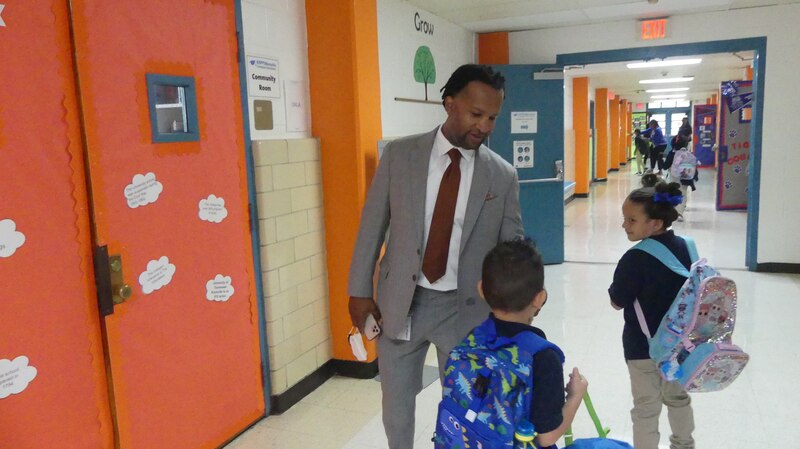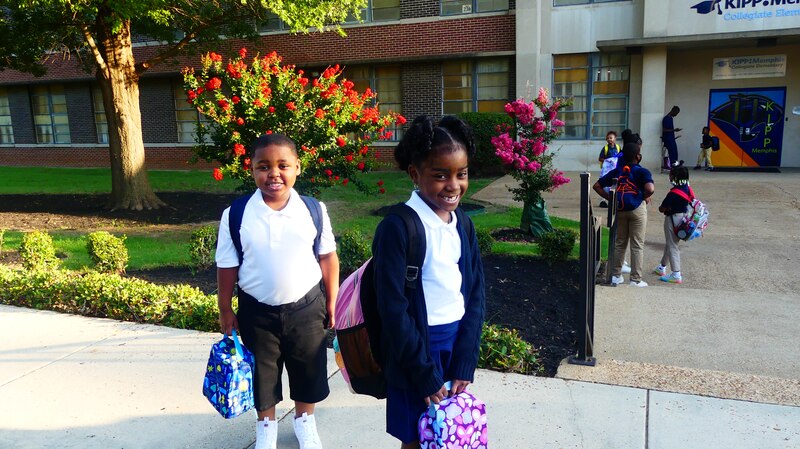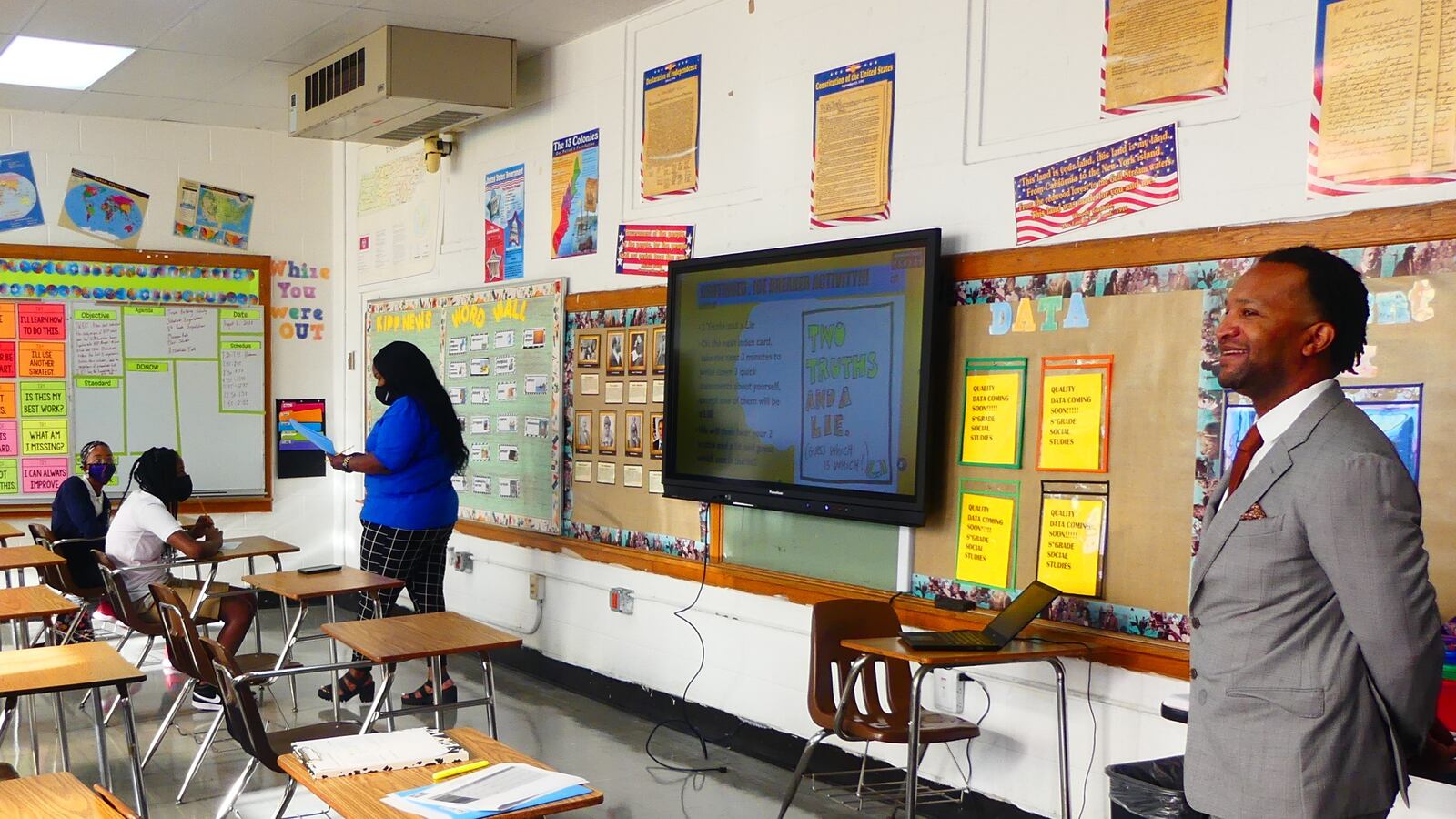KIPP, a national nonprofit network of tuition-free, public charter schools, opened its first Memphis school in 2002, promising families a new, “joyful, academically excellent” educational option.
KIPP Memphis now serves nearly 1,800 students across five North Memphis area schools — and has become known as the city’s oldest and longest-standing charter network.
But in recent years, it has faced numerous challenges, from school closures and low academic performance to high turnover among leadership and teaching staff.
KIPP Memphis grew to seven schools by the beginning of 2020, only to close two schools in South Memphis later that year, citing financial hardships and unsatisfactory academic progress.
Earlier this year, the network narrowly avoided having to shutter two other schools due to low academic performance. Memphis-Shelby County Schools board members said they wanted to give the network “an opportunity to prove themselves” under new leadership.
For 2021-22, three of five KIPP Memphis schools received the state’s highest rating for academic growth as measured by year-end testing under the Tennessee Value-Added Assessment System.
As KIPP Memphis celebrates its 20th anniversary, CEO Antonio Burt thinks the charter network is on its way to “finding our sweet spot” in Memphis’ changing educational landscape after the pandemic.
“I think it’s a time of great opportunity for us — a time for us to say, 20 years later, we’re now stronger than ever,” said Burt, who is beginning his first full school year after becoming CEO in November. “We look forward to taking that momentum and furthering and continuing to bolster our plan.”
Burt came to KIPP after serving as Memphis-Shelby County Schools’ chief of schools. Before that, he oversaw all the district’s lowest performing and struggling schools as an assistant superintendent, and earned national acclaim for turning two low-performing Memphis schools into models of student achievement.
He sat down with Chalkbeat for a one-on-one interview earlier this summer to reflect on his first partial year heading KIPP Memphis, share the network’s new “Back to Basics” theme, and discuss his vision for this school year and beyond.
This interview has been lightly edited for length and clarity.
Q: Tell me about your first school year at the helm of KIPP. What did you learn, and how has that impacted your focus this school year?
“Those first 90 days were a lot of listening and learning ...”
A: It was very informative coming into the organization in November and spending roughly the first 90 days really learning the ins and outs of the network — from human capital to the priorities that were already laid out — and then considering what are the areas that we need to strengthen.
Those first 90 days were a lot of listening and learning … while also identifying those strategic priorities that we need to really strengthen … We identified what we call the Seven Pillars of Change. Those seven areas range from getting grounded with our KIPP values, addressing the human capital challenge — which is a challenge across the country — as well as focusing on improving our infrastructure, literacy, and making sure we bring our parents along while we’re doing this.
We’re strongly committed to (community) engagement, while also addressing the needs of our KIPPsters and also future employers. We’re focused on ensuring that our kids are really truly college and career ready when they leave our doors … while also strengthening and ensuring that we have long term financial sustainability.
Q: What is KIPP Memphis doing specifically to boost college and career readiness?
A: We’re expanding our course offerings to ensure that we have more dual enrollment course offerings, and more (Advanced Placement) course offerings.
And then we’re embarking upon a three-year process to ensure that all of our campuses are STEM certified … by the Tennessee Department of (Education). So this will be year one of that.
“We’re focused on ensuring that our kids are really truly college and career ready when they leave our doors.”
But we also want to ensure that with those dual enrollment courses and with providing certain industry certification courses, that we’re aligning with what those high-impact areas or fields … that want graduates with specialized skills when they leave high school … like advanced manufacturing, coding, and robotics. We want our students to be able to walk into the workforce in those fields that pay a very high livable wage.
Q: How have you worked on recruiting and retaining staff since joining KIPP?
A: Early in the new year … we really rolled out the long-term plan (which included having all teaching staff reapply for their positions). And with that plan, we talked about how we will be posting positions, what we were looking for in individuals that apply and that will be selected for those roles. So it was very transparent. Internal applicants knew months in advance before that went live in March. We gave people a two-month notice around “Hey, this is the direction of the network going forward. We would love to have those people that feel that they meet the new set of standards and requirements.”
We did have a lot of internal applicants that applied; quite a few were rehired. But we also did job fairs beginning in March on a rolling basis every month. At the first hiring fair, we had over 200 applicants that came from charter and traditional schools in Memphis, Mississippi, Arkansas, and all over. …
And we utilize other resources — we utilized Teach 901, we utilized a pre-screening platform that we have as part of the (national) KIPP Foundation, we marketed on Chalkbeat, we utilized our social media platforms. And we continue to utilize those outlets to make sure we’re casting a wide net.
“... The pandemic showed us that you really don’t understand what a person might be going through, in some instances, until it’s too late.”
We also offered a $10,000 signing and retention bonus for teachers, administrators, and additional building-level staffers … Employees want to feel a sense of value belonging, and that goes with the financial aspect, but it also goes with the social-emotional aspect … We’re trying to be really creative … thinking about how we really incentivize our employees in other areas, whether that’s time off, recognizing certain holidays — just really doing things from a morale perspective. …
We brought in wellness sessions last school year, which offered massages and different things, because we wanted to just meet people where they are — because the pandemic showed us that you really don’t understand what a person might be going through, in some instances, until it’s too late.

Q: KIPP Memphis predominantly serves students of color and children from low-income families — groups that were hit hardest by the pandemic. How has KIPP been striving to meet their needs at this moment?
A: Starting last year, we opened our doors up on Saturdays, to say, “Hey, we’re here. We want to still provide instructional support. Let’s do it in a less stressful environment.” So students come for a few hours, we learn, we also have engagement activities.
And then we did a lot of things toward the tail end of the school year. We celebrated our KIPPsters with a lot of different events, and we brought our parents in. This upcoming school year, with our Back to Basics theme, we have a heavy focus around the essence of basic standards for supporting the whole child. We believe in doing that through different programs that we bring into the schools. …
We’ll be bringing Junior Achievement to each of the campuses, and that’s really to meet needs around financial literacy, but also giving kids learning experiences in a non-traditional manner and method.
We’ll be increasing field trips, and we’ll also be doing a lot of Parent University (sessions) to make sure we’re meeting the needs of our parents, who are also supporting our kids while they’re at home.
I’ll also be implementing something where I just talk directly to our KIPPsters, so they have an opportunity to have lunch with the CEO in a structured form … I want to hear straight from them (about) things that we can improve upon, things we’re doing well … It’s really about us being grounded and staying connected to each of our core audience, meaning our teachers, our KIPPsters, and our families.
Q: What kinds of topics does your Parent University touch on?
A: Parent University will focus on career advancement and career readiness. Also, it’ll be around social-emotional and health well-being strategies. Topics will also range from childcare tips to how to connect with agencies that can support kids, whether they’re 4 or up to 16. Also career readiness strategies — resumes and applications in certain industries that are looking for certain types of individuals.
Also, it’ll be conversational topics around resources that are being utilized inside schools, because we know a lot of the new curricula that’s being utilized in schools are much different from what our parents learned. … We want to show parents how to best support their child at home.
Q: Reflecting on your first partial school year, what are you most proud of?
A: What I’m most proud of is coming into a new network in the middle of a year that was truly the first full year back post-pandemic … and withstanding any challenges that were in place by entering in but also getting … all of our KIPPsters — educators, students and families — sort of level-set around a new way of work, a new level of expectations. …
We did a lot of great listening and learning sessions with our parents. We heard from them; we connected with them. We feel that due to that foundational level work, we’re set up to really run really fast in regard to implementing a lot of the different strategies that we have designed for this upcoming year. …
We ended the school year at a different place than where we started … with a 95% staff rate. When I entered the role, we had vacancies, virtual teachers, so on and so forth. So I feel that’s a huge accomplishment to begin this school year being fully staffed in all areas, across all campuses.

Q: What do you see as the biggest challenge ahead of you and KIPP Memphis as a whole?
A: I would say the biggest challenge … is to maintain (that staffing level), and ensuring that we have the best of the best across the board in every area and every role.
The next challenge will be “Hey, parents, we’re full speed ahead. We’re back to bell-to-bell instruction, each and every day. Can you support us in ensuring that our KIPPsters are at school each and every day?” …
I think there’s also still a level of uneasiness and uncertainty for certain communities. … There is still some skepticism in regard to the vaccine, the safety, and the pandemic. So our challenges in upcoming years will be really nipping that uncertainty in the bud, ensuring that our parents understand that we’re going to exhaust all measures to ensure our kids are safe, but we need them at school each and every day.
“Coming up on a 20 year anniversary, I thought we needed a theme. We need something that drives and guides our work daily.”
Q: How did you land on this year’s Back to Basics theme, and what does it mean to you?
A: Coming in over the first 90 days, we did an in-depth analysis around what are those larger gaps that I see that we could be stronger in. Coming up on a 20 year anniversary, I thought we needed a theme. We need something that drives and guides our work daily. …
So what does basics mean? So when we think of “B,” for basics, that’s breaking the educational barriers. We know educational barriers have plagued certain communities year after year. … The “A” is getting back to our core business of achieving academic excellence. “S” stands for supporting the whole child … more so now than any other time before, considering kids are coming out of a pandemic. The “I” is inspiring a joyful learning environment. … “C” is connecting with the community. We know that we can’t do this work alone, we have to do it right, and to do that, we have to work alongside our constituents and alongside our parents. … And “S” is at all times, at every layer, every individual is a part of the KIPP network and must strive for excellence.
We feel that if we get back to basics and we really hit those core areas, we will be headed in the right direction, and will be further fulfilling the promise that we made to families 20 years ago.
Samantha West is a reporter for Chalkbeat Tennessee, where she covers K-12 education in Memphis. Connect with Samantha at swest@chalkbeat.org.


